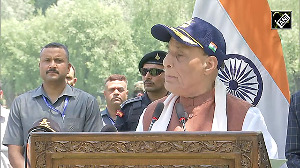A bill to allow the private sector to mine six atomic minerals, including lithium, and deep-seated minerals like gold and silver was approved by the Lok Sabha on Friday.

The Mines and Mineral (Development and Regulation) Amendment Bill, 2023 was passed by the Lok Sabha through a voice vote, amid continuous sloganeering by Opposition members over the Manipur issue.
The bill seeks to allow the private sector to mine six out of 12 atomic minerals. Under the existing act, all 12 atomic minerals are reserved for mining and exploration by state-owned entities.
The atomic minerals which will be opened for the private sector exploration are lithium (used in manufacture of batteries in electric vehicles, and other energy storage devices), beryllium, niobium, titanium, tantalum and zirconium.
'These minerals have various applications in space industry, electronics, communications, energy sector, electric batteries and are critical in net-zero emission commitment of India. Upon removal of these minerals from the said list, exploration and mining of these minerals will be opened up for the private sector as well. As a result, exploration and mining of these minerals is expected to increase significantly in the country,' said the statement of objects and reasons of the bill.
The bill also empowers the central government to exclusively auction mining lease and composite licence for certain critical minerals.
Deep-seated minerals include gold, silver, copper, zinc, lead, nickel, cobalt, platinum group of minerals, diamonds, etc, which are difficult and expensive to explore and mine as compared to surficial or bulk minerals.
'Share of deep-seated minerals in total mineral production is meagre at present. The country is mostly dependent on imports of these minerals. The proposed exploration licence would facilitate, encourage and incentivise private sector participation in all spheres of mineral exploration for critical and deep-seated minerals,' the statement said.
Union Minister for Coal and Mines Pralhad Joshi said the amendments in the bill will be a 'game changer'.
'So far we were granting only 2 kinds of licences -- composite and mining licence. Now we have brought in exploration licence through transparent auction route,' Joshi said.
The minister further said India will produce 1 billion tonne of coal this year which will make the country self-sufficient in the energy sector.
"Earlier, we were talking only about coal imports, now we are thinking that by 2025-26 we will stop import of thermal coal," he added.
The minister also informed the House that the mining of beach sand minerals will be reserved for public sector undertakings.
Beach sand minerals include ilmenite, rutile, leucoxene, garnet, monazite, zircon and sillimanite.
The bill was later passed by voice vote amid the din.











